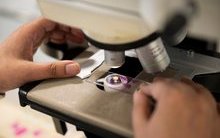The report, Estimating the cost of growing the NHS cancer workforce in England by 2029 by Cancer Research UK indicates that a 45% staff increase is needed across seven cancer-related professions to meet Health Education England’s (HEE) aim to provide world-class services for cancer patients by 2029.
However, for the histopathology workforce, the report findings show that without targeted action and investment, the number of histopathologists is forecast to reduce from the existing shortfall by an additional 2% by 2029. Histopathology is the only profession of the seven examined by the authors where current trends suggest a decline in staff numbers.
To have a chance of meeting 45 per cent growth ambition, the report analysis estimates the profession would require 580 more staff at a potential maximum cost to HEE of £118 million.
Professor Jo Martin, President of The Royal College of Pathologists said:
’CRUK’s report outlines the stark reality facing our histopathology workforce in delivering world class cancer services in the face of rising demand. The need for more investment to meet the ambitious targets set by government, which includes a commitment to detect 75% of cancers at an early stage by 2028, is clear.
`Building the cancer workforce, not just in histopathology, but also in haematology and our other areas, has to be a key investment priority for government. Without it, the projected increase in the rates of cancer compounded by the effect of the COVID-19 pandemic and the UK’s exit from the EU, there is a real risk that we reverse some of the progress that has been made in improving cancer survival rates over previous decades.
We know that the earlier diagnosis of cancers leads to much better outcomes for patients and histopathologists are vital to cancer management from initial diagnosis to guiding patients’ treatment.
As well as more investment to recruit and retain more histopathology staff, we also would like to see more histopathology training places, better IT for day-to-day work, capital investment to implement digital pathology more widely, so staff can work more efficiently and flexibly and the development of advanced clinical practitioners to work alongside medically-qualified histopathology colleagues.’
Pathologists are central to the success and delivery of screening progammes, Increases in survival rates for cancer has improved in part due to screening programmes initiatives.







